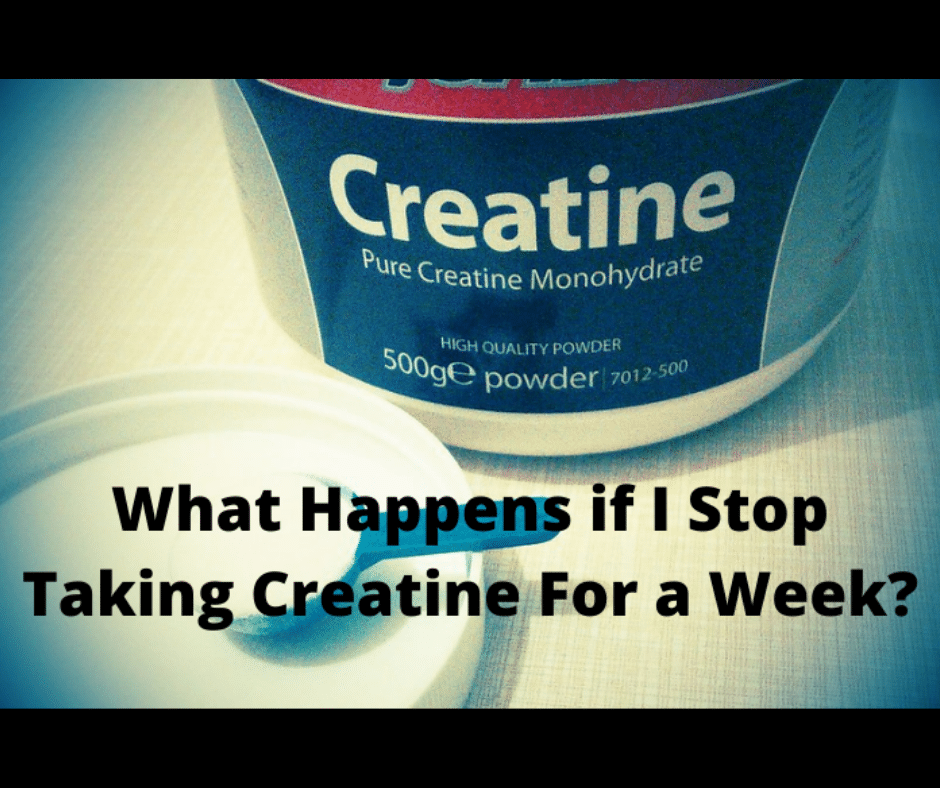If you stop taking creatine for a week, you won't notice a big difference. After about 3 weeks of supplementing with about 5 grams of creatine per day, your body and muscles will typically reach a state of creatine saturation. It can take up to 3 weeks for these creatine stores to leave the body once use is stopped. So, in reality, if you stop taking creatine for just a week, your muscles will still have adequate reserves. Also, don’t forget that creatine is naturally produced in muscle cells and is also found in many food sources.
A week is not long


I want to be clear, if you stop taking creatine for a week, it won't have any effect.
In fact, if you "feel" like your energy levels or exercise are affected during the week off, it's likely a placebo effect.
The purpose of taking it is to flood your muscles with creatine, which helps them produce energy.
This certainly leads to better strength and lean muscle gains.
However, supplementing with 5 grams per day usually takes about 3 weeks to fill the muscles with creatine.
This also explains why there is a loading phase, basically it gets you there faster.
Therefore, the goal is to flood your muscles with creatine and then return to a maintenance dose of 3-5 grams per day.
Now the truth is yours Muscles are filled with creatine, which means they are unlikely to deplete their stores overnight.
In fact, your creatine stores don’t really start to deplete until at least two weeks after you stop taking them.
For most weightlifters taking the recommended dosage, it takes up to 3 weeks for creatine stores to be fully excreted from the body.
That being said, depending on the amount you take, this may take up to 4-6 weeks.
In other words, not taking creatine for a week will have little effect.
You should also remember that no matter what, your muscles will naturally produce a baseline level of 1-2 grams of creatine per day.
Plus, many foods, especially red meat and fish, are high in creatine, which means you can "supplement" it naturally through nutrition.
Don’t believe the creatine hype
You often hear that if you stop taking creatine for a day or two, let alone a week, it will have an impact on you.
Some would say that as the muscles become less saturated, you lose a bit of weight, mostly water weight.
Others claim that their energy has dropped in the days since they stopped taking creatine.
Some people will even tell you that they lost size and muscle within a week.
As I've already mentioned, if your muscles become saturated with creatine supplementation, it will take at least two weeks before any form of creatine depletion begins to occur.


So if someone notices a direct difference, it's either a placebo effect or their muscles are simply not saturated with creatine in the first place.
That being said, it's completely ridiculous to claim you've lost size or strength in a matter of days.
In fact, I'm sure you've realized that your gains are actually made while recovering outside of the gym.
So when you're not exercising, your muscles repair themselves and get bigger and stronger again.
"Holiday Effect"
This also explains why you often come back from vacation looking better than when you left.
You know you're going on vacation, so your training levels are at their peak in anticipation.
In fact, you're approaching overtraining.
You then spend a week or two eating, drinking, and relaxing, and you probably don't hit the hotel gym more than a few times a week.
But somehow you look great.
Therefore, anyone who says that stopping creatine for a few days or a week will severely impact size and strength is talking nonsense.
I would even go so far as to say that the companies that make and sell creatine will specifically tell you not to miss a day.
To me this is nothing more than marketing hype just to get you to keep buying and taking more creatine.
Don't believe the hype.
Should you cycle creatine?
You'll read so much confusing and conflicting information about creatine that it's enough to put you off taking it altogether.
I'm sorry if I added to your pain.
Someone will swear again circulating creatineand those who believe there is nothing wrong with taking it permanently.
Really, I think it comes down to personal choice and how your body responds to creatine.
You will often hear that you should supplement with creatine for one week, take it for another 7-10 weeks during the maintenance phase, and then take a week or two off.
The reason is that your body usually adapts to supplementation, so it's best to reset everything internally and then take creatine again.


Then someone will tell you that there is no need to cycle creatine.
Well, actually, there's no need to stop taking creatine entirely (since you'll still be recycling creatine in some way).
This requires taking a higher dose, such as 10 grams, for about 4-5 days and then returning to maintenance levels again.
In fact, your body has adapted, so you raise the level and actually confuse the body.
I've always preferred doing a creatine cycle, but that's just my opinion.
What happens if you stop taking creatine completely?
Deciding to stop supplementing with creatine can bring about a series of physiological changes, especially if your body has previously responded positively to it.
It is estimated that up to 30% of people are "creatine non-responders," meaning that creatine has no effect on them.
Therefore, if you are one of the 30%, discontinuing creatine supplementation will not have blinding effects.


Initially, one of the most noticeable effects is a reduction in water retention within muscle cells.
Creatine has properties that increase muscle water absorption, helping to help muscles look fuller and result in slight weight gain.
When you stop supplementing, this effect is reversed, resulting in a loss of muscle size and possibly muscle atrophy. Overall weight is slightly reduced due to water loss.
In addition to immediate visual and weight changes, stopping creatine can affect your performance, especially in activities that require quick bursts of energy or high-intensity effort.
Creatine plays a vital role in rapidly replenishing ATP (adenosine triphosphate), the primary energy carrier in cells, which is especially important during brief, strenuous physical activity.
Without the additional boost from supplementation, you may see a slight decrease in your ability to maintain optimal performance levels, impacting your strength, power output, and recovery rate between workouts.
| 🚫 Stop Creatine? What to expect 🚫 | |
|---|---|
| Creatine non-responders | Up to 30% of people believe that creatine has no effect and therefore stop taking it. |
| Time to deplete creatine stores | Most people need 3-6 weeks. |
| Immediate results | Water loss and muscle plumpness decrease. |
| long term effects | Strength and power may decrease, affecting performance in the gym. |
| brought to you mybodyweightexercises.com 💪 | |
your body will eventually adapt
However, the human body is very adaptable.
It usually takes three to six weeks for your body to adapt to the lack of supplemental creatine.
The body's natural creatine synthesis, combined with dietary sources, will begin to compensate, although not yet to the levels achieved through supplementation.
This adjustment phase varies from person to person, but will ultimately result in performance indicators and physical abilities stabilizing to pre-supplementation levels.
It's also worth noting that the effects of discontinuing creatine supplementation are not permanent.
If you choose to reintroduce creatine into your regimen, you can restore previous benefits such as increased muscle water retention, improved high-intensity performance, and faster recovery.
This reversible nature emphasizes creatine's effectiveness as a supplement and the body's ability to adapt to changes in diet.
So while stopping creatine supplementation may cause some noticeable changes, especially in those who initially responded well to it, these adjustments are part of the natural process as the body returns to its baseline state.
Understanding these shifts can help manage expectations and maintain a balance in fitness and supplementation strategies.
final thoughts
So I want you to have a better idea of what to expect after a week of stopping taking creatine.
In fact, very few.
It takes at least 2 weeks for your creatine stores to begin to deplete, and up to 3 weeks (4-6 weeks in some cases) for creatine to completely leave the body.
There's a lot of marketing hype out there claiming that you shouldn't miss a day from creatine supplementation.
However, once the muscles are saturated, you don't have to worry about it for the time being.
I recently discussed another popular issue regarding supplements, namely Is it okay to eat only creatine without protein?.


Hi everyone, I'm Partha, the owner and founder of My Bodyweight Exercises. I am a Level 3 Personal Trainer and accredited Strength and Conditioning Specialist by the British Register of Sports Professionals. I have been going to the gym regularly since 2000 and coaching clients since 2012. My goal is to help you achieve your body composition goals.
Source link
